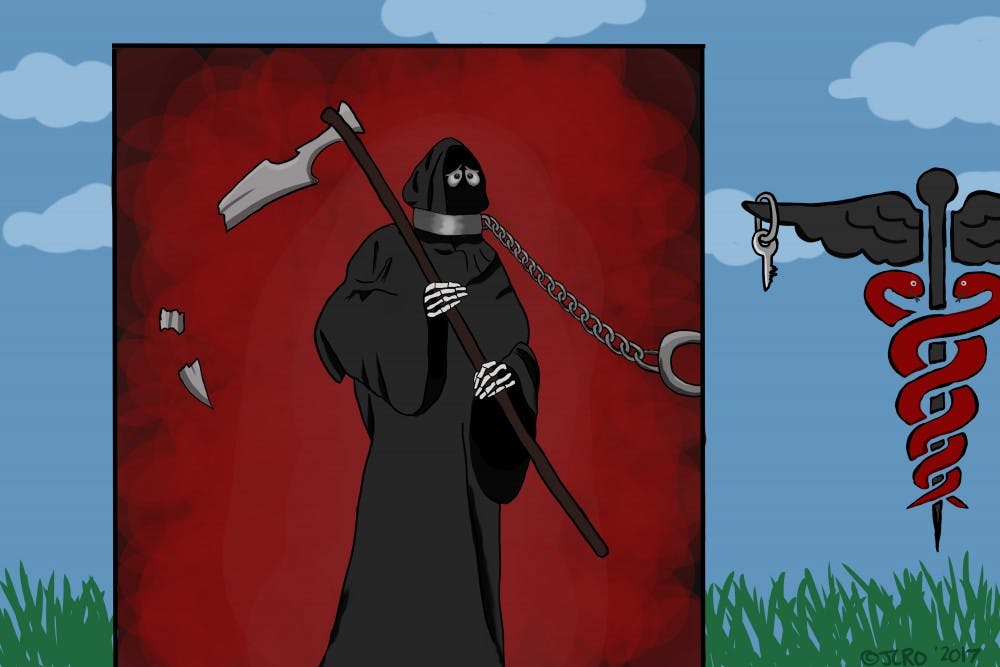How we die is a profoundly personal journey.
As college students, we don't consider the topic of death frequently, let alone the process of dying. However, it is a universal theme that does not discriminate against anyone, no matter their age.
Throughout history, the process of dying is represented differently across cultures and religions. While some religions, like Buddhism and Hinduism believe it marks the beginning of rebirth or reincarnation after death, others, like Christianity, believe it marks the beginning of a journey to Heaven.
Regardless of the beliefs, to fully understand the process of dying and its aftermath, we must examine how the dying process has changed over time.
Throughout our history—particularly recently with medical advancements—the human race has looked far and wide to answer a complex question: What is a natural death? With so many life-sustaining technologies to potentially keep us alive indefinitely, many don’t know what a natural death entails anymore.
Universities like ASU offer courses exploring the cultural and religious aspects of death and dying.
While the biological process of dying is universal, the behaviors associated with expressing grief are very much culturally bound. Courses like these offered at universities allow students to learn how cultures have developed ways to cope with the process of dying.
Sally Johnson, a professor of psychology at Glendale Community College, believes that all students should study the cross cultural aspects of death.
"By learning about the way different cultures and religions treat the dying process, we can gain more insight into how they deal with the heartache and pain that comes along with death and how it manifests itself in the funeral/death process," she said.
However, it is important to remember that the process of dying has drastically changed over the past several decades with the development of modern resuscitative technologies. It seems as if a “natural death” has no place in our society anymore.
The idea of a natural death is merely a reflection of the social and scientific context of the time that death took place in.
When we picture a natural death, we envision an individual lying in bed surrounded by loved ones, taking their last breaths in a place of comfort and homeliness, a sight of peace and tranquility often dreamed of in literature.
However, with the help of modern medicine and innovative technology, our perceptions of natural death have now changed.
Thanks to modern medicine, diseases like polio, scarlet fever and others have been rendered preventable, treatable, or far less common now. This has led to a dramatic extension of life.
However, these new technologies have also been used to prolong the life expectancy of individuals with terminal illnesses, such a cancer.
While the idea of prolonging life might sound like a good thing, it often forces patients, their loved ones and their doctors to make difficult, painful decisions.
In some cases, when patients have no hope of surviving, we use technology and drugs to simply keep them alive in a biological sense.
Families and doctors may feel as though they need to exhaust every available treatment or medication to prolong the dying process, however, that can be a naive and selfish outlook.
But what we don't understand is that there is a difference between being alive and living. Medicine can’t cure everything, but we often act as though death is optional.
The dying process is usually centered around the elderly, who are approaching there last few months of life due to natural causes. When younger individuals do die, it's usually the cause of an accident or life-threatening disease.
However, individuals of all ages, especially students should be aware of the cultural significance of death, especially as we begin to cope with the loss of loved ones or go into professions where death is common.
We must recognize the limits of our human knowledge and technology and accept the fact that eventually, all of us will die. As morbid as it sounds, it is a natural process of life and should not be pegged as a taboo topic.
Reach the columnist at yasmine.mian@asu.edu or follow @yasminemian on Twitter.
Editor’s note: The opinions presented in this column are the author’s and do not imply any endorsement from The State Press or its editors.
Want to join the conversation? Send an email to opiniondesk.statepress@gmail.com. Keep letters under 500 words and be sure to include your university affiliation. Anonymity will not be granted.
Like The State Press on Facebook and follow @statepress on Twitter.




